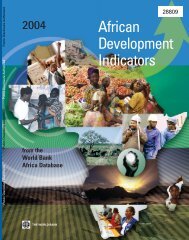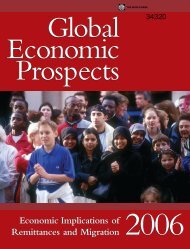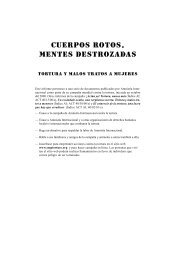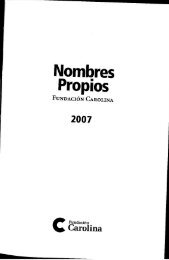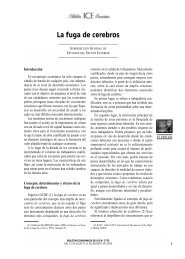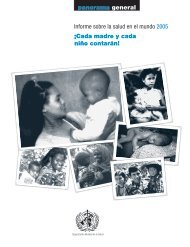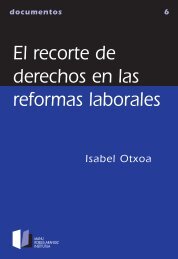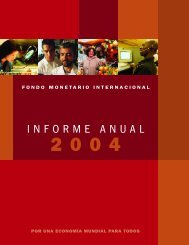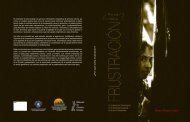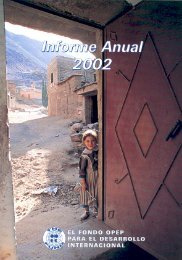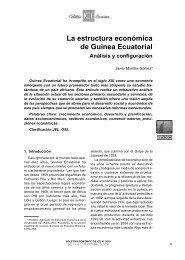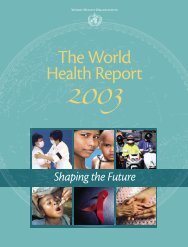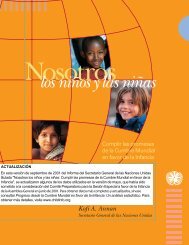Educación para todos: el imperativo de la calidad; Informe ... - eFaber
Educación para todos: el imperativo de la calidad; Informe ... - eFaber
Educación para todos: el imperativo de la calidad; Informe ... - eFaber
- No tags were found...
Create successful ePaper yourself
Turn your PDF publications into a flip-book with our unique Google optimized e-Paper software.
005432 / ANEXO2<strong>Informe</strong> <strong>de</strong> Seguimiento <strong>de</strong> <strong>la</strong> Educación <strong>para</strong> Todos en <strong>el</strong> MundoReferencias *Acharya, A.; Fuzzo <strong>de</strong> Lima, A.; y Moore, M. 2004. Aid proliferation: how responsible are the donors ? Brighton,Instituto <strong>de</strong> Estudios sobre <strong>el</strong> Desarrollo (Documento <strong>de</strong> trabajo Nº 214).Adams, D. 1993. Defining educational quality. Arlington (Virginia, EE.UU.), Institute for International Research(Publicación IEQ Nº 1, <strong>Informe</strong> bienal).ADEA (Asociación pro Desarrollo <strong>de</strong> <strong>la</strong> Educación en África). 2003. Le défi <strong>de</strong> l’apprentissage: améliorer <strong>la</strong> qualité d<strong>el</strong>’éducation <strong>de</strong> base en Afrique subsaharienne. Documento <strong>de</strong> discusión <strong>para</strong> <strong>la</strong> Reunión Bienal sobre <strong>la</strong> Calidad<strong>de</strong> <strong>la</strong> ADEA (Grand-Baie, Mauricio, 3-6 <strong>de</strong> diciembre <strong>de</strong> 2003). París, Asociación pro Desarrollo <strong>de</strong> <strong>la</strong> Educaciónen África (ADEA).Akerlof, G. A.; y Kranton, R. E. 2002. “I<strong>de</strong>ntity and schooling: some lessons for the economics of education”.Journal of Economic Literature, Vol. 40, págs. 1.167-1.201.Akyeampong, K. 2004. “Aid for s<strong>el</strong>f-h<strong>el</strong>p effort? A sustainable alternative route to basic education in NorthernGhana”. Journal of International Co-operation in Education (Hiroshima), Vol. 7, Nº 1, págs. 41-52.Akyeampong, K.; Ampiah, J.; Fletcher, J.; Kutor, N.; y Sokpe, B. 2000a. Learning to teach in Ghana: an evaluationof curriculum d<strong>el</strong>ivery. Brighton, Centro <strong>para</strong> <strong>la</strong> Educación Internacional, Universidad <strong>de</strong> Sussex (Documento <strong>de</strong>discusión d<strong>el</strong> Proyecto MUSTER, Nº 17).Akyeampong, K.; Furlong, D.; y Lewin, K. M. 2000b. The costs and financing of teacher education in Ghana. Brighton,Centro <strong>para</strong> <strong>la</strong> Educación Internacional, Universidad <strong>de</strong> Sussex (Documento <strong>de</strong> discusión d<strong>el</strong> Proyecto MUSTER,Nº 18).Al<strong>de</strong>rman, H.; Behrman, J. R.; Ross, D. R.; y Sabot, R. 1996. “The returns to endogenous human capital in Pakistan’srural wage <strong>la</strong>bor market”. Oxford Bulletin of Economics and Statistics, Vol. 58, págs. 29-55.Al-Samarrai, S. 2002. Achieving education for all: how much does money matter ? Brighton, Instituto <strong>de</strong> Estudiossobre <strong>el</strong> Desarrollo (Documento <strong>de</strong> trabajo Nº 175, diciembre).Al-Samarrai, S.; Benn<strong>el</strong>l, P.; y Colclough, C. 2002. From projects to SWAPs: an evaluation of British aid to primaryschooling 1988-2001. Londres, Departamento <strong>para</strong> <strong>el</strong> Desarrollo Internacional (DFID).Altonji, J. G.; y Pierret, C. R. 2001. “Employer learning and statistical discrimination”. Quarterly Journal ofEconomics, Vol. 116, Nº 1, págs. 313-350.Amadio, M.; Truong, N.; Ressler, D.; y Gross, S. 2004. Quality education for all ? World trends in educational aimsand goals between the 1980s and the 2000s. Documento <strong>de</strong> referencia <strong>para</strong> <strong>el</strong> <strong>Informe</strong> <strong>de</strong> Seguimiento <strong>de</strong> <strong>la</strong> EPTen <strong>el</strong> Mundo 2005. Ginebra, Oficina Internacional <strong>de</strong> Educación (OIE) <strong>de</strong> <strong>la</strong> UNESCO.An<strong>de</strong>rson, C. S. 1982. “The search for school climate: a review of the research”. Review of Educational Research,Vol. 52, Nº 3, págs. 368-420.An<strong>de</strong>rson, L. W. 2004. Increasing teacher effectiveness. 2ª edición. París, Instituto Internacional <strong>de</strong> P<strong>la</strong>neamiento<strong>de</strong> <strong>la</strong> Educación <strong>de</strong> <strong>la</strong> UNESCO (IIPE).An<strong>de</strong>rson, S. (compi<strong>la</strong>dor). 2002. School improvement through teacher <strong>de</strong>v<strong>el</strong>opment: case studies of the Aga KhanFoundation projects in East Africa. Lisse (Países Bajos), Swets & Zeitlinger.An<strong>de</strong>rson Pillsbury, A. 2004. Education in emergencies. Documento <strong>de</strong> referencia <strong>para</strong> <strong>el</strong> <strong>Informe</strong> <strong>de</strong> Seguimiento<strong>de</strong> <strong>la</strong> EPT en <strong>el</strong> Mundo 2005.Angrist, J. D.; y Lavy, V. 1997. “The effect of a change in <strong>la</strong>nguage of instruction on the returns to schooling inMorocco”. Journal of Labor Economics, Vol. 15, págs. 48-76.—. 1999. “Using Maimoni<strong>de</strong>s’rule to estimate the effect of c<strong>la</strong>ss size on scho<strong>la</strong>stic achievement”. Quarterly Journalof Economics, Vol. 114, Nº 2, págs. 533-575.—. 2001. “Does teacher training affect pupil learning? Evi<strong>de</strong>nce from matched comparisons in Jerusalem publicschools”. Journal of Labor Economics, Vol. 19, Nº 2, págs. 343-369.ANTRIEP (Red Asiática <strong>de</strong> Instituciones <strong>de</strong> Formación e Investigación en P<strong>la</strong>nificación <strong>de</strong> <strong>la</strong> Educación). En prensa.Improving school management in Asia through capacity building of head teachers. París, Instituto Internacional<strong>de</strong> P<strong>la</strong>neamiento <strong>de</strong> <strong>la</strong> Educación (IIPE) <strong>de</strong> <strong>la</strong> UNESCO.Apple, M. W. 1978, “I<strong>de</strong>ology, reproduction, and educational reform”. Com<strong>para</strong>tive Education Review, Vol. 22, Nº 3.* Todos los documentos <strong>de</strong> referencia pre<strong>para</strong>dos <strong>para</strong> <strong>el</strong> <strong>Informe</strong> <strong>de</strong> Seguimiento <strong>de</strong> <strong>la</strong> EPT en <strong>el</strong> Mundo 2005 se pue<strong>de</strong>n consultar en:www.efareport.unesco.org



